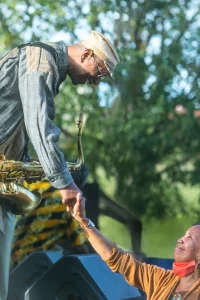If all “jazz” shares a single trait, it’s that nothing will stifle it. Adjusting to covid-19 strictures, Chicago (just for instance) in the past two months has been site of: A stellar Hyde Park Jazz Festival; Herbie Hancock’s homecoming concert at Symphony Center; audiences happily (for the most part – no reported incidents otherwise) observing […]
City of Chicago, music promoter
Lollapalooza 2021 had some 385,000 attendees (without significant Covid-19 outbreak, fortunately) but featured little of host Chicago’s indigenous talent or styles. And that’s just wrong, declared Department of Cultural Affairs and Special Events commissioner Mark Kelly, launching the month-long Chicago in Tune “festival” at a reception August 19. Here’s the still-evolving event calendar of hundreds […]
Jazz/Improv Chicago: Wide-ranging talents, free fests, PoKempner pix
Chicago’s jazz/improvised music scene contains multitudes, last week ranging from the wild yet earnest Liberation Music Collective to veteran piano sophisticate Michael Weiss in trio, as two of Marc PoKempner‘s photos document (and more of his vision, focused on links between local music and politics — Obama included — is on exhibit titled “Harold’s Got […]

